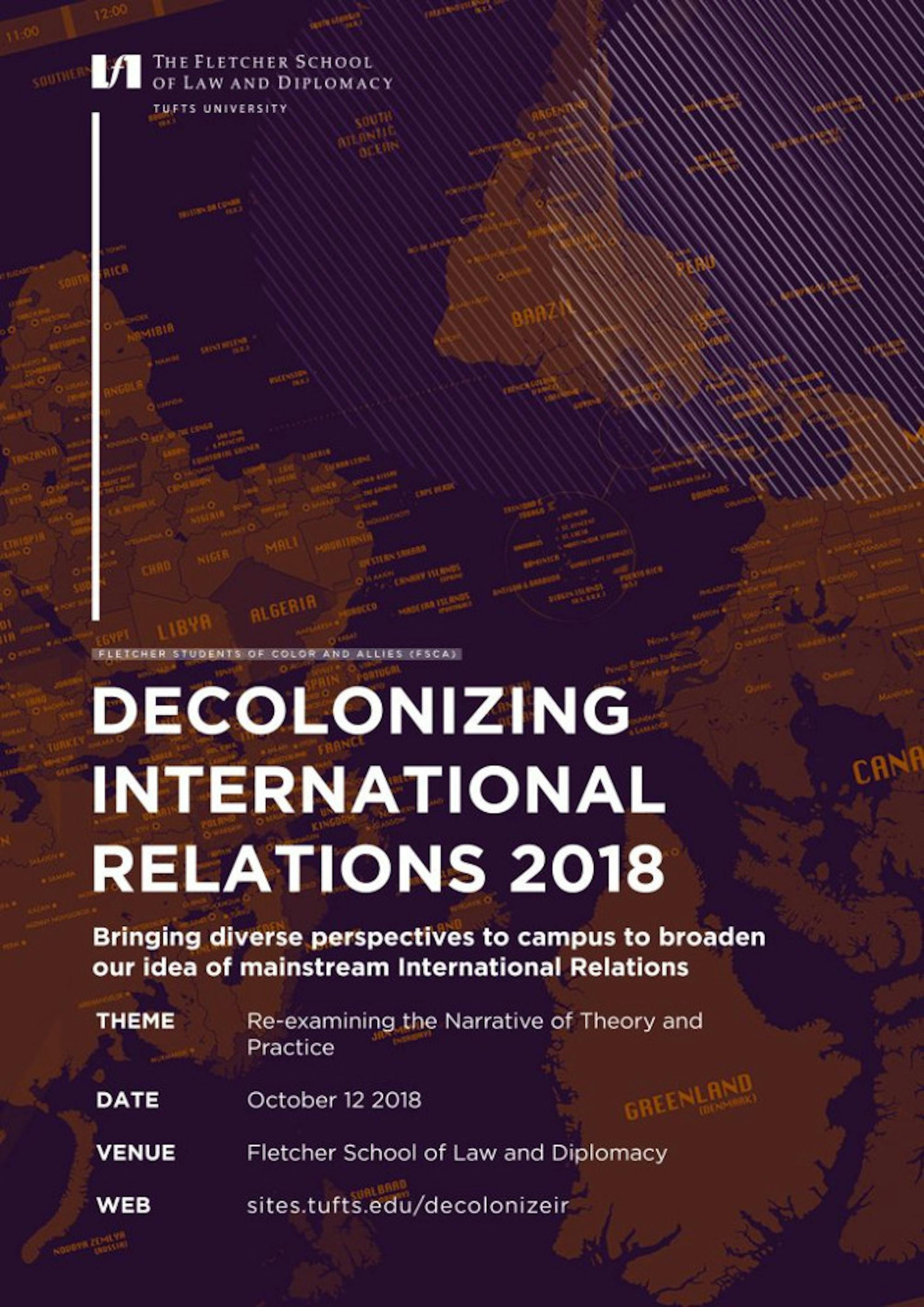They were eating spicy fries when they got the idea. Latifah Azlan and Khadija Mohamud, second-year master's candidates at The Fletcher School of Law and Diplomacy, took advantage of Fletcher’s history of strong student-led conferences and organized their own. This conference, scheduled to take place today, is called “Decolonizing International Relations: Reexamining the Narrative of Theory and Practice.”
The idea for the conference stemmed from Azlan's and Mohamud’s educational experiences.
“At Georgetown, I was fortunate enough to have one African-American male professor who was the only black faculty member at the time in the School of Foreign Service,” Mohamud said. “And upon arriving at Fletcher, I was, frankly, surprised at the lack of diversity in our courses.”
Azlan holds a bachelor's degree in international relations and affairs from Boston University, while Mohamud received a bachelor's degree in foreign service and international politics from Georgetown University. Azlan chose to pursue international relations because it is a multidisciplinary field that combines many of her interests, but, for Mohamud, it was her personal experience that shaped her academic decision.
Mohamud grew up in Washington D.C., but her childhood was marked by her parents' experience as Somali immigrants.
“I grew up ... with the war in Somalia in the [1990s],” she said. “From as young as I can remember, the ramifications of the conflict had an effect on my family. Just remembering the waves of people who would stay with us temporarily, the challenges of applying for asylum, being undocumented — it always made me feel powerless. I was curious what ... they were fleeing from and who gets to decide who gets to come into what country.”
Due to Fletcher’s small size, the lack of diversity among the students and faculty is more pronounced, according to Azlan and Mohamud.
“[My undergraduate experience] featured classes with different varieties of professors who came from all sorts of different backgrounds and who looked all sorts of different ways,” Azlan said.
Mohamud, however, was also frustrated by a lack of diversity as an undergraduate student at Georgetown, especially in the materials her professors included in their syllabi.
“We kept re-reading Samuel Huntington’s 'The Clash of Civilizations and the Remaking of World Order,'” she said. "I was like, 'Okay guys, we have to move on.'"
Mohamud noticed that in many of her classes, most of the texts were written by individuals who are not members of the communities about which they wrote. When she brought up this point in class, it was often met with naive surprise.
“That, to me, was a little disturbing because this isn’t something that is particularly revolutionary,” Mohamud said. “This is a field that is meant to understand communities and people. We have to hear from these communities, too ... Why are they always an afterthought?”
She says that this dominance of Western narratives followed her to Fletcher, where she has had just one professor of color. Neither Azlan nor Mohamud believes that there is a sufficient push to decolonize the curriculum.
“I don’t think that there is a wide movement towards [that] right now," Azlan said. "However, I think that the response to the conference has been very encouraging.”
Azlan and Mohamud are excited to provide a platform for traditionally marginalized voices on Friday.
“To me, the intention of the conference ... sits at two levels,” Azlan said. “First, there’s the wider level of wanting a shift in the way that we think about and teach [international relations to] be more intentional and thoughtful about the kinds of readings, scholarship and practice that we’re exposed to. On the second level is the Fletcher community, itself, pushing for greater engagement of this issue within the wider community.”
Azlan indicated that the addition of marginalized voices to the discourse would not supplant traditional scholarship but would instead enhance it. She and Mohamud carefully and intentionally selected the speakers for the conference in order to create the most meaningful conversation possible.
“We want to uplift voices that are already out there,” Mohamud said.
She continued, saying that international relations students should have access to the ideas of individuals whom they would not have come across otherwise.
Amahl Bishara, associate professor of anthropology and director of minors in the Consortium of Studies in Race, Colonialism, and Diaspora, highlighted the conference's ability to shape conversations.
“Conferences like this, and courses of study like our minor in colonialism studies, can play a big role in opening up critical perspectives on the dominant discourses in international relations," Bishara said.
Mohamud drove home the importance of the conference.
“There’s so much that we can be benefitting from," she said. "There’s so much that is missing in terms of perspectives and scholarships that’s out there, but we’re not seeing in our syllabi or in the classroom."
As a member of the conference’s marketing and outreach committee, senior Emily Ng was tasked with spreading awareness of and garnering support for the conference in various undergraduate departments at Tufts. She believes that it will inspire people to think about international relations in new ways.
“I hope it gets people to return to the basic concepts we talk about in Intro to [International Relations] like balance of power, liberal democracy and things that are really theoretical by going back to the questions of 'Why do we have a government?' and 'What [does it] really give in [its] services to the people?' and thinking about who has the power in the government," Ng said.
'Decolonizing International Relations' conference to present marginalized perspectives

The promotional poster for the Fletcher conference 'Decolonizing International Relations' is pictured.





